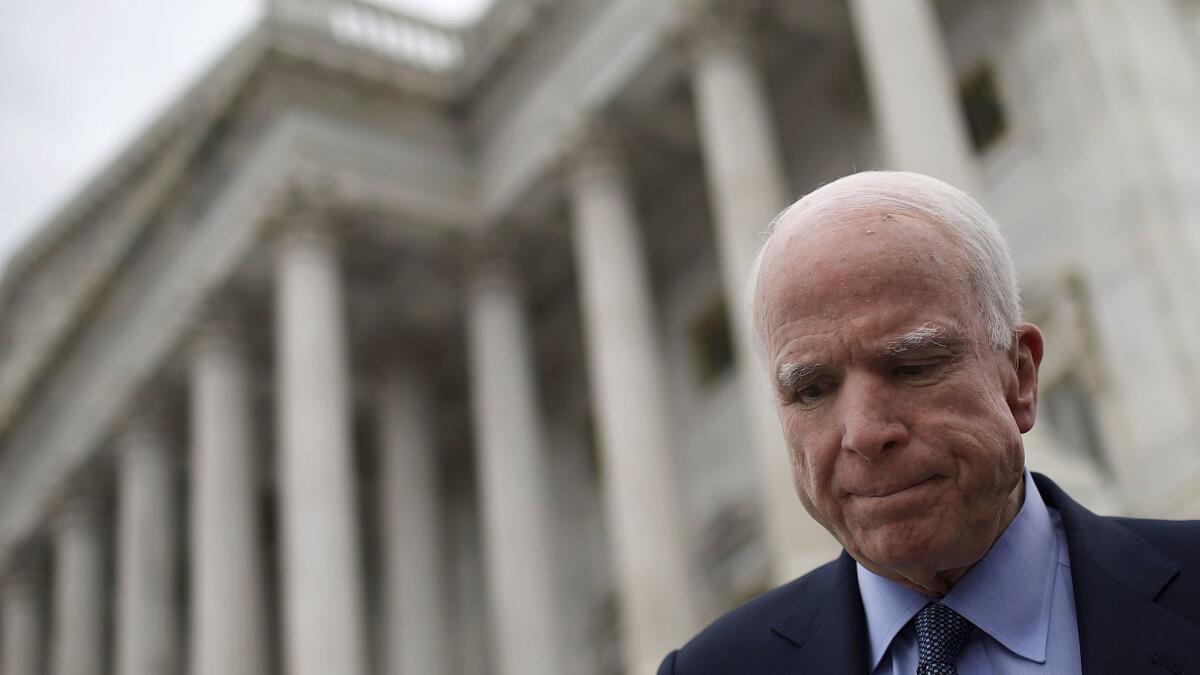He may bark and bite, but John McCain has a rare bipartisan appeal

- Share via
John McCain, with his short fuse and lashing tongue, is not always an easy man to like, or to get along with.
The Arizona senator acknowledged as much in a wry tweet he dispatched Thursday morning — candor and self-deprecation always being two of his strongest, most appealing suits.
For the record:
8:42 p.m. Jan. 26, 2025An earlier version of this article said Norman Ornstein was a congressional scholar at the Brookings Institution. He is with the American Enterprise Institute in Washington.
“I greatly appreciate the outpouring of support,” McCain wrote, hours after revealing he had been diagnosed with an aggressive form of brain cancer. “Unfortunately for my sparring partners in Congress, I’ll be back soon, so stand-by!”
At a time of bone-deep political division, the two-time Republican presidential hopeful is a rare unifier.
Conservative, temperamental, pugnacious, he nevertheless commands not just respect but a deep regard among Democrats, Republicans and the reporters who cover them.
The bulletin on his health Wednesday night brought a flood of tributes and the sort of hopeful wishes to be expected from the White House and bipartisan leaders of Congress.
More striking were the heartfelt paeans from his ideological opposites, like former Secretary of State and Massachusetts Sen. John F. Kerry, who said on Twitter, “I love @SenJohnMcCain. Unbeatable, unbreakable.”
Katy Tur of NBC was among a number of reporters who shed any pretense of dispassion or disinterest, tweeting, “Fight, John McCain. Fight.”
I love @SenJohnMcCain. Unbeatable, unbreakable.
— Former Secretary of State and Democratic Sen. John F. Kerry of Massachusetts
At a time most members of Congress come carefully bubble-wrapped and predictably rigid, McCain is neither.
While fundamentally conservative, he has broken with fellow Republicans — on immigration, climate change, gay rights — enough times to have the “maverick” label practically stitched onto his shirtfront. Along the way, he’s garnered allies and antagonists in both parties.
Mainly, though, the 80-year-old McCain has been forgiven his trespasses, both personal and political, because of his extraordinary life story, an account filled with unimaginable strength and bravery.
“He is just a genuine figure and a great American hero, for all his warts and all the frustrations,” said Norman Ornstein, a congressional scholar at the American Enterprise Institute in Washington, who has known McCain personally for more than three decades. “You’re going to cut the guy a lot of slack because of what he went through.”
The story loses none of its power for its frequent telling: As a Navy pilot, he was shot down over Vietnam in October 1967, landing in a lake in the center of Hanoi, with a broken leg and two broken arms.
He was a prize captive, the son of a famous American admiral, and the North Vietnamese sought to capitalize by offering him early release. It would have been a public relations coup, a seeming humanitarian gesture, but McCain refused; his release would have breached the military code of conduct that requires the release of POWs in the order they were captured.
In all, McCain spent 5½ years in captivity, enduring torture and long stretches in solitary confinement. He still bears the scars, both psychic and physical, including a limp and inability to raise his arms above his shoulders.
His harrowing experience was recounted in TV ads, helping him win his first election to the House in 1982. But since then, after being elected to the Senate in 1986, he has come to be known in other ways.
As a champion of campaign finance reform — after being scolded for poor judgment in an influence peddling scandal — as a leading expert on defense and foreign policy, as the ask-me-anything presidential candidate in 2000 who broke new ground for openness and accessibility.
If his 2008 White House bid was less celebrated — his selection of running mate Sarah Palin continues to confound many of his closest friends and political allies — there is a stand-out moment that gained renewed currency in the moments and hours after he announced his cancer diagnosis.
At an October rally in Minnesota, a woman rose from the audience and told McCain she could not trust his Democratic opponent, then-Sen. Barack Obama. “I have read about him,” he said. “And he’s not, he’s not — he’s an Arab.”
McCain shook his head, took the microphone and gently corrected her.
“No, ma’am,” he said. “He’s a decent family man, a citizen that I just happen to have disagreements with on fundamental issues, and that’s what this campaign is all about.”
He went on. “I admire Sen. Obama and his accomplishments; I will respect him. … I want everyone to be respectful, and let’s make sure we are. Because that’s the way politics should be conducted in America.”
It was a show of grace and a sentiment all the more noteworthy in today’s vicious political climate, as the “warrior at dusk” — in the poignant words of McCain’s daughter, Meghan — wages what may the final battle of a remarkable lifetime.
ALSO
Sen. John McCain diagnosed with brain tumor after recent surgery
More to Read
Get the L.A. Times Politics newsletter
Deeply reported insights into legislation, politics and policy from Sacramento, Washington and beyond. In your inbox three times per week.
You may occasionally receive promotional content from the Los Angeles Times.











